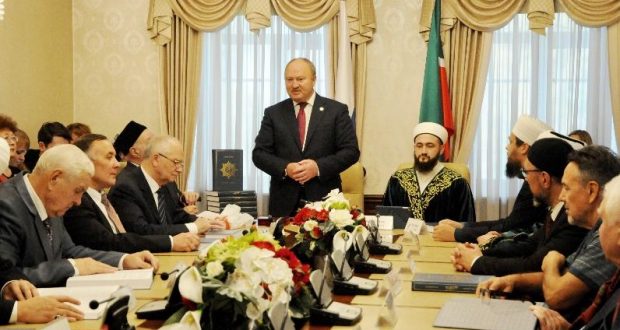October 18, 2019
The first official presentation of the publication of the translation of the meanings of the Koran in the Tatar language “Kulam Shurif. Mәgynәvi tәrҗemә ”, prepared by the Religious Board of Muslims (DUM) of the Republic of Tatarstan.
The presentation was attended by Deputy Prime Minister of Tatarstan – Plenipotentiary Representative of the Republic of Tatarstan in the Russian Federation Ravil Akhmetshin, Chairman of the DUM of the Republic of Tatarstan, Mufti Kamil Hazrat Samigullin, Deputy Head of the Department for Relations with Religious Organizations of the Office of the President of the Russian Federation for Presidential Administration of the Russian Federation Almaz Fayzullin, Coordinator of the Strategic Group Visions “Russia – Islamic World” Farit Mukhametshin, Mufti Albir Krganov, writer and editor-in-chief of the newspaper Tatar World Rinat Muhamadiev, deputy VGTRK’s leader’s leader Andrei Nikitin, RT first mufti deputy Rustem Hazrat Valiullin, RT chief jalil Hazrat Fazlyev, People’s Artist of Russia and Tatarstan Renat Ibragimov, as well as Muslim religious, public and government figures, scientists, and the media.
Fundamental work is the first in the history of the DUM RT to translate the meanings of the Qur’an, which was published as part of the Year of the Interpretation of the Qur’an, announced in Tatarstan. In preparing the publication, taffirs in the Tatar and Old Tatar languages were used, in particular Nugmani, Muhammad Sadiyka ibn Shah Ahmad Imankoly Kazan “Tashhilyul-bayan”, Shaykhulislam Hamidi “Al-Itkan”, as well as taffirs in Arabic and Turkish, including works Imam Al-Mahalli and Al-Suyuti “Tafsir Al-Qalyalein” and Sheikh Mahmoud Al-Ufi “Kuran Majid”, At-Tabari, Al-Maturidi, Ibn Qasir, Al-Kurtubi, Al-Nasafi, Alusi.
In addition, in the process, the specialists of the TUM RT turned to the experience of modern Tatar tafsir authors: Rabit Batulla, Farid Hazrat Salman, Gabdelbari Hazrat Isaev and others.
At the same time, a distinctive feature of the translation of the meanings of the Koran from the DUM RT is the accurate transmission of the text of the Holy Book in the Tatar language, which made it possible to reproduce the syntactic structure and lexical composition of the script as close as possible and exclude the possibility of rumors. For the convenience of the reader and to facilitate understanding of the meanings of the Qur’an, the text of the work contains comments separated by brackets from a literal translation.
Thus, the translation of the Koran into the Tatar language in the variation of the TUM RT allows us to convey to the reader not only its literal meaning, but also the historical cultural background on which the text of the Holy Book, nuances, subtexts and metaphors of the Koran language were recorded and pronounced. In addition, on each page of the tafsir, in accordance with the translation, a paginal original of the text of the Koran is placed.
Positive conclusions about the text of the translation of the meanings of the Qur’an from the DUM of RT were received from muftis, authors of other tafsirs, linguists, literary scholars, Islamic scholars, religious departments of Muslims and public organizations of Tatarstan and Russia.
The second stage of translations of the meanings of the Koran was prepared by the Spiritual Administration of Muslims of the Republic of Tatarstan in Russian.
The publication of the Koran’s tafsirs in the Tatar and Russian languages, along with the revival of the Russian traditions of co-printing, expressed in modern Tatar theology, the creation of a multi-stage system of Muslim education and educational standards for Islamic educational institutions, the organization of Muslim media space, the development of federal common halal standards for the production of products and services, implemented by the Spiritual Administration of Muslims of the Republic of Tatarstan in order to form a basis for further on the development of Russian Islam.

